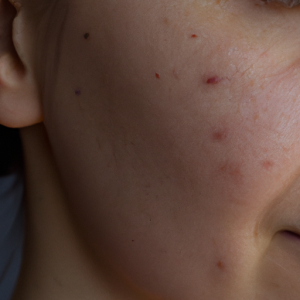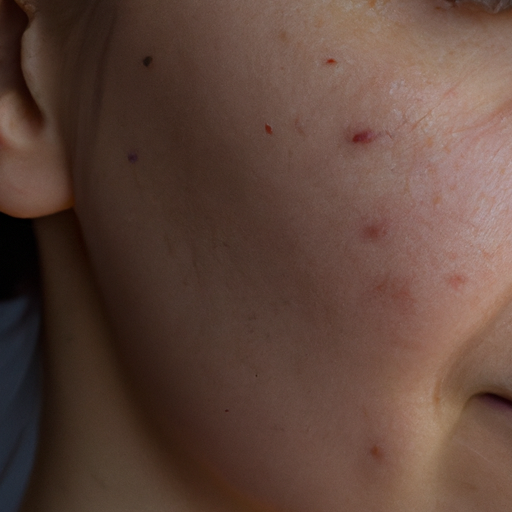We all know that acne is never fun. But what if your acne doesn’t go away and instead leaves dark spots and uneven texture on your skin? These reminders are called acne scars, and they can be quite a nuisance.
In this blog post I’ll take a deep dive into the causes of acne scars, discuss home remedies and professional treatments, as well as some tips on prevention. So let’s get started!
Causes of Acne Scars
It’s a bummer, but acne scars are a real thing. The cause of them? Lotsa different things. Hormonal shifts, genetics, bad hygiene, even certain cosmetics can lead to scarring. So what can you do about it? Well, here’s a breakdown of the causes – knowledge is power, so keep reading.
When it comes to hormones, fluctuating levels of testosterone and estrogen can up your odds of developing acne scars. That’s why puberty is often such a prime time for skin problems – it’s when our bodies are going through lots of changes.
But hormones aren’t the only culprits. Genetics can play a part too, with some people more predisposed to scarring than others. If your parents had problems with their skin, you may be at greater risk.

Hygiene also plays a role, in that if you don’t take proper care of your skin, you could make matters worse. That means picking or scratching your pimples (no-no!), not washing enough, or even washing too much. It’s all important – do it correctly and you’ll be less susceptible to acne scars.
Finally, certain cosmetics can be a trigger. We’re talking anything that’s too harsh on your skin – think certain soaps, sunscreens, and detergent-based cleansers. Keep an eye out for cleansers that say they’re noncomedogenic – those won’t clog your pores and should help reduce scarring.
Home Remedies for Acne Scars
Sometimes the best treatments for acne scars can be found right in your kitchen! There are numerous DIY home remedies that work wonders on tackling pesky scarring, from lemon juice to honey – and that’s before you get to all of the other simple items like baking soda. Let’s take a look at some of the top home remedies for treating those stubborn acne scars.
Lemon juice is one of the most popular home remedies for getting rid of acne scars. It has natural bleaching properties which helps lighten dark spots and reduce redness in the skin. To use it, simply mix together two tablespoons of freshly squeezed lemon juice with two teaspoons of water. Apply directly to the scars and leave on for ten minutes or so before rinsing off with warm water.
Another great home remedy option is honey. Honey has natural anti-inflammatory and antimicrobial properties, making it an ideal treatment for acne. It also penetrates into skin easily and works to repair damaged skin cells. To use, simply dab the affected area with raw, organic honey and allow to sit for 10-15 minutes before rinsing off with warm water.
Baking soda is another great solution for treating acne scars. Just make a paste by combining one part baking soda with two parts water, and apply directly onto the scars. Leave on for 10 minutes, then rinse off with lukewarm water. This will help exfoliate the skin, removing any dirt or oil buildup. Repeat up to three times per week for best results.
Aloe vera is a powerful natural healer that can help to reduce inflammation and speed up healing. It’s also an antioxidant, fighting free radical damage that can cause premature aging. To use aloe vera as a home remedy, just mix two tablespoons of the gel with two drops of tea tree oil. Gently massage into the affected area, then leave on for 20 minutes before washing off with lukewarm water.
Finally, apple cider vinegar is a natural astringent that helps diminish scars, break down dead skin cells, and balance out your skin’s pH levels. For an easy home remedy, combine one tablespoon of ACV with four tablespoons of water. Apply directly to the scars, leave on for 10 minutes, then rinse off with lukewarm water. This should be done once daily for best results.
Professional Treatments for Acne Scars
Nobody wants to be dealing with acne scars – they’re not only unsightly, but can leave you feeling self-conscious and frustrated. If the home remedies aren’t cutting it, there are several professional treatments available. Let’s take a look!
A popular option is chemical peels, which involve applying acidic solutions to the skin that burn away the top few layers. This helps reduce the appearance of scars, although it can be painful. That said, some people find peels really effective in tackling scarring.
Laser therapy is a great way to treat acne scars. It involves using lasers to target damaged cells and encourage new tissue to form; this can help minimise scarring and improve skin texture. This method isn’t cheap though – it’s quite pricey – so make sure you weigh the cost against the benefits.
Microneedling is another relatively low-cost option. It works by driving tiny needles into your skin, which stimulates collagen production. Studies have found that after several months, patients often noticed a visible reduction in their scarring. Plus, it doesn’t hurt too much either.
Dermal fillers are the last option on our list. This technique involves injecting special substances (like hyaluronic acid) directly into the scar tissue. This helps add moisture and volume, reducing the appearance of depressions caused by the scarring. Fillers won’t be a permanent solution, since they eventually break down, but can be a good stop-gap measure.
Prevention of Acne Scars – The Keys To A Healthy Skin!
It’s a no-brainer that prevention is the best medicine. In the battle against acne scars, prevention plays an even more important role. Sure, there are treatments that can help reduce the appearance and severity of existing scars, but there’s nothing quite like avoiding them in the first place.
The first step? Keep your hands off your face. It can be tempting to pick or touch your skin when you see blemishes, but resist the urge! Picking can cause further damage, making it harder for your skin to heal. It also increases your chance of developing scars.
Next, switch out any harsh cleansers for gentle, non-abrasive products. Always opt for formulas designed for sensitive skin and remember to stay away from scrubs. You want something to cleanse your skin, not exfoliate it.
You should also make moisturizing a daily ritual—yes, even oily skin needs hydration! Choose a light, oil-free formula if possible and be sure to look for one with SPF. Sun protection is the key to healthy skin, and it’s especially important when you’re looking to avoid scarring.
Last, but certainly not least, take care of existing acne ASAP. Don’t let breakouts linger; treat them right away so they don’t have the chance to become increasingly inflamed. If a blemish just won’t go away on its own, consider speaking to a dermatologist. They can help you determine which treatments will be most effective.
With these simple tips, you’ll be well on your way to a blemish-free complexion. Take care of your skin, and you may never have to deal with the hassle of acne scars. Now that’s something worth smiling about!
Conclusion
It’s important to take proper care of your skin to avoid the development of acne scars in the first place. Unfortunately for some, this isn’t always easy. But there are things we can do to help treat and reduce the appearance of existing acne scars. Home remedies, such as lemon juice, honey, baking soda, aloe vera and apple cider vinegar, can be used to soothe and reduce redness. If you’re looking for a more intensive solution, there are professional treatments like chemical peels, laser therapy, microneedling and dermal fillers. All of these methods have been proven to be very effective in getting rid of acne scars. No matter what treatment you choose, remember to keep up with your skincare routine, avoid touching and picking at your skin, and wear sunscreen every day!
Acne Scar Removal FAQ
How do you get rid of acne scars overnight?
I know how hard it can be to get rid of pesky acne scars overnight, but I’m here to tell you that it can be done! First, you’ll want to make sure you take good care of your skin. Wash your face twice daily with a mild facial cleanser and exfoliate several times a week. This will help remove dirt, oil and dead skin cells so your skin can heal more quickly. You’ll also want to apply a heavy moisturizer to keep your skin hydrated. Avoid using abrasive skin care products, like facial scrubs, as this can cause further damage to your skin.
But what about blemishes and scars you already have? To reduce their appearance, give topical retinol creams and hydroquinone a try. These products can help reduce redness and break up the dark pigment in your skin, making your scars less noticeable. For more stubborn scarring, you may want to look into laser therapy treatments, which use light to break down the cells that cause acne scars, allowing your skin to heal and look smoother.
Lastly, you’ll want to make sure you wear sunscreen every day, both to protect your skin from the sun’s harmful rays and to help prevent scarring. Sun exposure can make scars look more pronounced, so make sure you apply SPF 30+ sunscreen before heading out into the sun.
Good luck and here’s to a smooth complexion!
How can I fade my acne scars in 3 days?
Well, if you’re asking me, the best way to tackle acne scars in just 3 days is to take a proactive approach to skin care. First and foremost, you want to exfoliate your skin to get rid of any excess dirt and gunk. This will help to open up the pores and remove any dead, dry skin cells that could be causing the scarring. Secondly, you could also use an over-the-counter product that contains ingredients like salicylic acid and glycolic acid to reduce inflammation and help with the healing process. Finally, consider incorporating a reliable moisturizer into your light-weight routine to help lock in moisture and give your skin an extra boost of hydration. With the right combination of products, you could see some serious results in just a few days!
How long do acne scars take to fade?
Well, acquiring acne scars can be pretty tough, especially in the short-term. The time it takes to fade them can be quite long – it really depends on the severity of the scar, your personal skin type, and the treatments you use. That being said, there are definitely a few ways to speed up the process. The key is to act fast and stick to a routine that fits your skin.
For starters, check with a dermatologist to get a sense of how bad your scars are and what you can do about them. They might recommend one of the many anti-aging creams available, or a light chemical peel to help reduce the look of your scarring. Over-the-counter products can be helpful too, but the key is to be consistent with application – don’t give up too soon!
Another good tip is to make sure you’re getting plenty of Vitamin C. Ascorbic acid can help reduce scarring by increasing collagen production and helping to even out skin tone. You can get more Vitamin C through dietary sources like citrus fruits, or you can take a supplement. It’s always best to consult a doctor before taking any kind of supplement, though.
Finally, use SPF religiously! Sun exposure can make scars look darker and more visible, so it’s important to wear sunscreen and cover up when you’re outdoors. Make sure to use a product that’s broad spectrum and at least SPF30. It’ll protect your skin from UV rays, and help your scars to fade faster.
Hope that helps!
